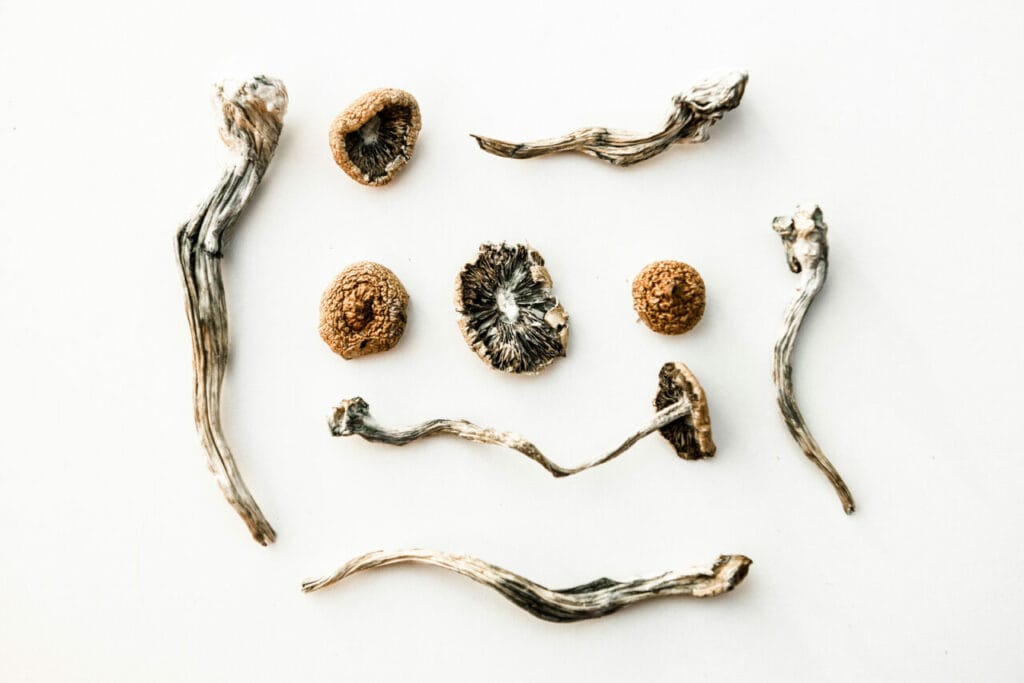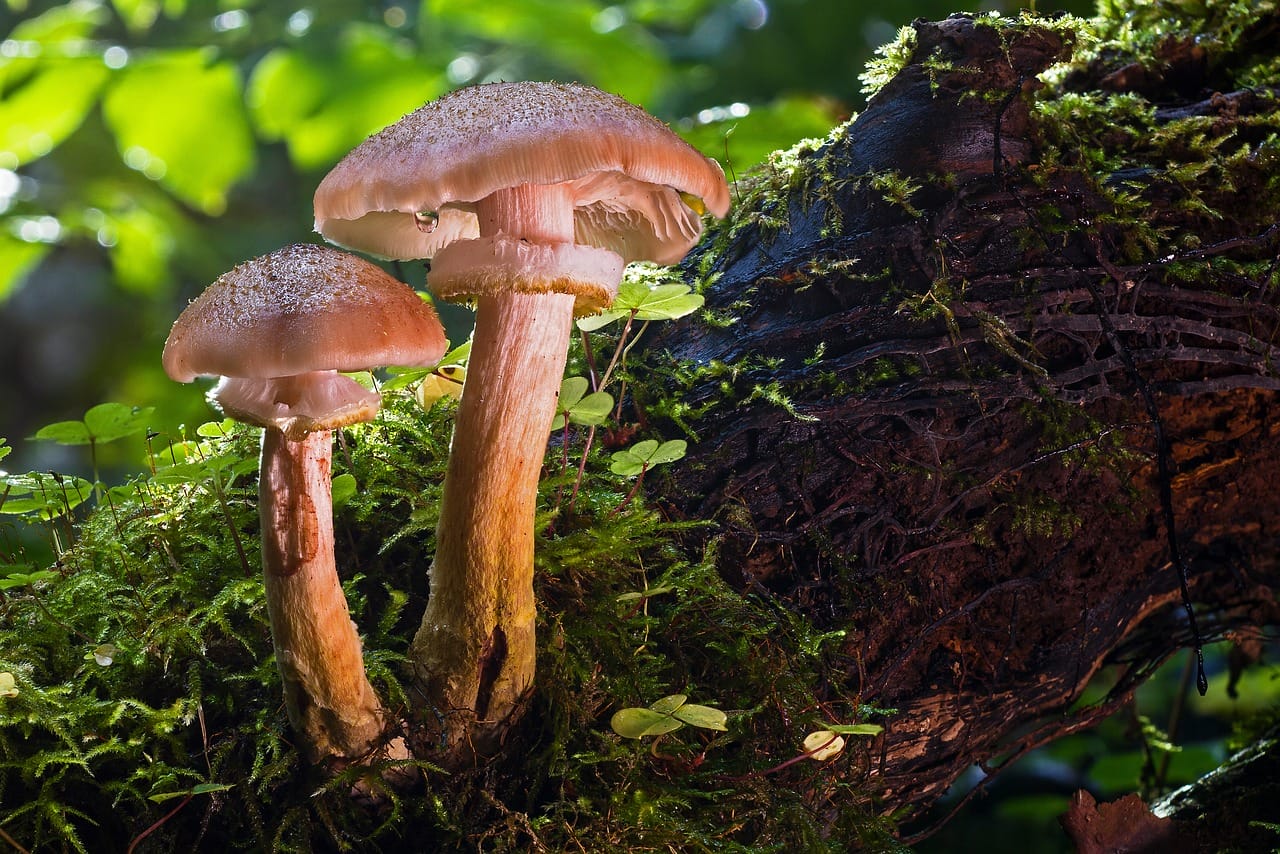While magic mushrooms were initially seen by many Canadians as a psychedelic substance primarily used for recreational purposes, scientific research into their active ingredient, psilocybin, has revealed its powerful potential in treating a range of mental health conditions.
As more research emerges, our understanding of psilocybin and its uses deepens. This growing awareness has made it easier for individuals to access these products through magic mushroom delivery services. A recent study explored its role in human consciousness, which could potentially explain its significant impact on the human brain. Let’s probe further into this fascinating discussion on magic mushroom products.
Key Takeaways:
- The cognitive function of early humans was likely influenced by psychedelic magic mushrooms, aiding their survival.
- Mushrooms play a critical role in neurological health due to their capacity to alleviate PTSD, depression, and anxiety.
- The influence of psilocybin on consciousness and brain function may enhance creativity, introspection, and abstract thinking.

Historical Usage and Importance of Magic Mushrooms
Historical evidence suggests that our ancestors have been utilizing the benefits of psychedelic magic mushrooms since ancient times. Traditional ceremonies and sacred rituals of indigenous communities often incorporated their use as a tribute to their gods. These mushrooms are found worldwide, especially in subtropical and tropical regions, including South and Central America, the Caribbean, Southeast Asia, and Africa.
Shrooms in Ancient Civilizations
Indigenous groups in Mexico have relied on these fungi for spiritual enlightenment, divine connection, and religious ceremonies since time immemorial. The Aztec Indians of South America referred to it as “God’s Flesh”, using it in healing rituals.
Evidence of use can be traced back to:
- Around 10,000 years ago in Australia
- Approximately 7,000 years ago in North Africa
- About 6,000 years ago in Spain.
These discoveries have led some researchers to argue that psilocybin played a significant role throughout history. The consumers of these mushrooms reported experiencing intense feelings of joy and visual hallucinations filled with complex geometric patterns.
The Significance of Mushrooms in the Bronze Age History of Spain
In the mid-90s, scientists found remnants, particularly strands of hair, from approximately 200 Bronze Age civilizations, hidden inside a cave in Minorca, Spain. The cave’s entry had been sealed off by fallen debris, which kept the artifacts in a remarkably preserved state. Examination of these hair samples revealed the presence of three alkaloids, substances known for their mind-altering effects.
These discoveries provide fascinating insights into the reasons and methods of ancient societies’ use of these substances. Contrary to popular belief, reaching an altered state of consciousness was quite routine during those times. However, the question of how these substances influenced human evolution remains unanswered.
The Connection Between Psilocybin and the “Big Bang Theory” of Human Evolution
Recent years have seen a renewed interest in psychedelic research, reinforcing the hypothesis that psychedelics may have contributed to the evolution of human consciousness. This idea, known as the stoned ape theory, was proposed by ethnobotanist Terence McKenna. The theory postulates that the use of psychedelics might have influenced the cognitive and cultural development of our species.
According to Dr. Thomas Falk, a professor of Philosophy and Education at the University of Dayton, this theory could potentially explain the sudden burst of creativity among Homo sapiens about 40,000 years ago, which signifies a substantial leap in early human cognitive capabilities.
It’s theorized that psychedelics allowed primitive humans to create and exist within self-constructed realities. Over time, their enhanced cognitive capabilities allowed them to replicate these experiences in their physical environments.
In his book “Food of the Gods“, Terence McKenna proposed his arguments that the stoned ape hypothesis has its origins in ancient shamanistic rituals and a speculated variety of plants and fungi.
“Capable of Triggering Neurological and Psychological Transformations”
Psychoactive substances possess the potential to catalyze significant neurological and psychological changes. These alterations could have played a vital role in the progression of our species.
With a multifaceted approach that merges biology, ethnobotany, and neuroscience, the study meticulously examines existing research on psilocybin and human awareness. It is proposed that these ancient humans’ increased contact with these fungi, due to a shift in their environment from forests to grasslands and a subsequent rise in exposure to animal dung, may have led to increased consumption. The “stoned ape” hypothesis, referenced in the study, suggests that this dietary change could have incited substantial alterations in the brains of early hominids.
Potential Consequences of Consuming Psychoactive Substances
The possible effects of consuming these fungi could span from enhanced hunting and scavenging skills, increased sexual drive, to heightened sensory perception. Coupled with psilocybin’s influence on consciousness and brain functionality, it is conceivable that these factors could have stimulated innovation, self-reflection, and abstract thinking, all of which are essential in the development of language.
The Peruvian scientists who led the study stress the need for additional exploration into the effects of these substances on the brain and human evolution. While it has impacted brain regions associated with memory, decision-making, and introspection, the evolutionary implications remain an area of ongoing research.
An independent genetic study indicates that magic mushrooms emerged approximately 67 million years ago. Human consumption of these fungi began millions of years ago, well before the advent of marijuana.
What are Dried Magic Mushrooms?
They contain a hallucinogen known as psilocybin. The effects can differ based on individual tolerance, body mass, and mode of consumption. Here are some expected effects:
- Profound joy
- Sense of tranquility
- Spiritual awakening and introspection
- A dreamlike state of feeling disconnected from one’s physical environment
- Modified visuals, such as seeing light halos and vibrant colors
- Enhanced sense of well-being
Despite its recreational use, many people use it for its therapeutic properties, particularly for its positive effects on brain health.
Effects on Neurological Health
The active compound alters mood, perception, and cognition by engaging with serotonin receptors in the prefrontal cortex. The enhancement of cognitive skills, such as the manipulation of visual and auditory experiences, intensifies one’s task execution performance.
Connection to Our Ancestors
Our early human ancestors, often referred to as the ‘stoned apes’, applied the same principle. Their discovery and use of these fungi, particularly during their ecological transition from forest to grassland habitats, resulted in a higher exposure to animal feces, leading to a subsequent increase in their mushroom consumption. The ‘stoned ape’ theory, mentioned in the study, suggests that this dietary shift could have initiated significant changes in the brain composition of early hominids.
The ingestion of psilocybin mushrooms might have influenced the evolution of their consciousness and cognitive capabilities. This could provide an explanation for their acquisition of vital survival skills.
Present and Future Interactions
Modern research reveals that individuals suffering from conditions such as cluster headaches, anxiety, anorexia, obsessive-compulsive disorder, PTSD, and depression generally exhibit low serotonin levels. Although selective serotonin reuptake inhibitors (SSRIs) are the standard treatment, they often require a significant amount of time to produce noticeable improvements. In contrast, shrooms can stimulate immediate alterations in brain neuron connectivity.
Current Psychedelic Research – Clinical Trials
Since the early 2000s, scientists have been exploring innovative treatments designed for individual patient needs for various psychiatric and behavioural disorders.
Owing to its capacity to infiltrate the central nervous system and boost cognitive function, it has proven effective in therapy. Recent research progress in 2020 suggests that psychedelic therapy using psilocybin products alleviates severe depression.
As reported by Matthew Johnson, a professor at Johns Hopkins Medicine, these substances modify the interaction of various brain systems. An increase in connectivity between brain regions that typically don’t communicate efficiently is evident. Conversely, regions that usually interact extensively demonstrate reduced communication.
This induced disarray is not merely a side effect but holds potential therapeutic value. Individuals suffering from depression often find themselves trapped in self-critical, repetitive thought patterns that worsen their condition. Psychedelics interrupt these patterns, enabling individuals to escape from their deeply rooted negativity during a psychedelic experience. This leads to more adaptable thinking and the capability to manage critical
Purchasing Magic Mushrooms Online: Your Gateway to Healing
A vast array of these controlled substances can be accessed online. Choose from a collection that is both safe and lab-verified, mitigating the risk of unintentionally buying poisonous mushrooms. Reliable vendors ensure the quality and safety of the products they offer.
| Product | Psilocybin Content | Psilocin Content | Benefits |
| Enigma | 0.76% | 0.07% | Boosts Focus, Creates Uplifting Effects |
| Atlantic Treasure Coast | 0.59% | 0.08% | Improves Concentration, Stimulates Creativity, Encourages Neuroplasticity |
| Blue Magnolia | 0.58% | 0.08% | Enhances Memory, Assists in Fighting Depression and Anxiety |
| Cambodian | 0.45% | 0.06% | Aids in Managing PTSD and Anxiety, Helps with Substance Abuse Recovery, Improves Mood |
Revealing the Latent Strength of Magic Mushrooms
All the progress we witness today, including the formation of civilizations, urban areas, and societies, are the outcomes of various advancements. Although the stoned-ape hypothesis may be a theoretical conversation between two people, scientific researchers are gradually uncovering evidence that supports the theory of psilocybin contributing significantly to human evolution.
If you’re in pursuit of enhanced cognitive development, Magic Mushrooms Montreal Canada’s magic mushroom delivery is your ideal destination. We offer a broad spectrum of high-quality shrooms from A to Z, with fast delivery options available in British Columbia and beyond.
Discover the future of personal growth — peruse our assortment of top-tier psychedelics online Canada today.
Commonly Asked Questions
Which type of shrooms did ancient civilizations consume?
Various types of fungi are spread worldwide, so there isn’t a singular type consumed by all societies. Some favored the well-known liberty caps, while others preferred Psilocybe cubensis. Most of them either ingested these mushrooms raw or created edible forms such as tea blends.
What is the modern-day role of psychedelics in human development?
In the contemporary world, psychedelics primarily function by activating the 5-HT2A receptor subtype. This interaction has proven useful in managing conditions related to stress, significantly affecting creativity and social behavior. Such effects could enhance adaptability and fitness, especially in societies heavily reliant on knowledge and social interconnectivity.
Did spiritual practices with shrooms influence human evolution?
Indeed, spiritual practices that employed shrooms have played a role in human evolution by molding cultural, religious, and social frameworks. They foster a deep sense of connection, creativity, and communal bonding.
Articles You May Find Interesting:





